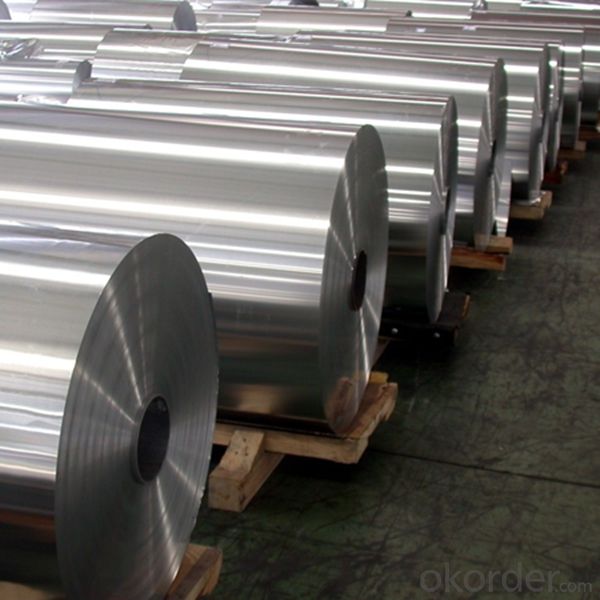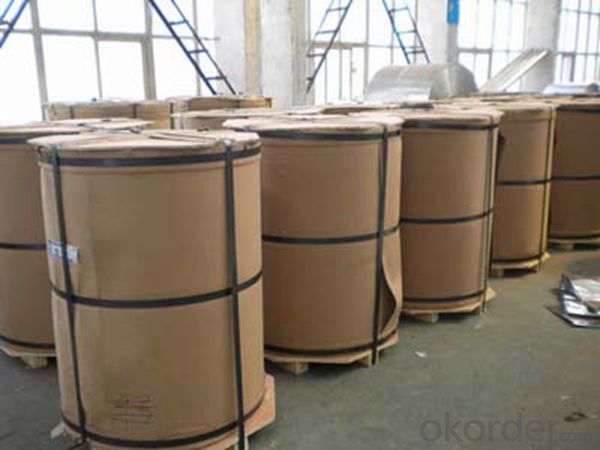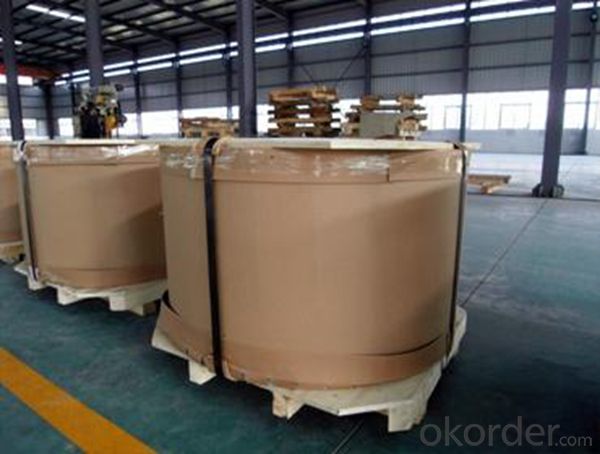Mill Finished Aluminium Coil AA1100 for Building
- Loading Port:
- Shanghai
- Payment Terms:
- TT OR LC
- Min Order Qty:
- 5 m.t.
- Supply Capability:
- 10000 m.t./month
OKorder Service Pledge
OKorder Financial Service
You Might Also Like
Item specifice
1. Specification of Mill Finished Aluminium Coil AA1100 for Building
characteristics | Application |
1) Super peeling strength | 1) Building exterior curtain walls |
2) Excellent surface flatness and smoothness | 2) Decoration and renovation additions for old buildings |
3) Superior weather, corrosion, pollutant resistance | 3) Decoration of interior walls, ceilings, bathrooms, kitchens and balconies |
4) Even coating, various colors | 4) Shop door decorations |
5) Fireproof, excellent heat and sound insulation | 5) Advertisement board display platforms and signboards |
6) Superior impact resistance | 6) Wallboards and ceilings for tunnels |
7) Lightweight and easy to process | 7) Industrial materials, materials for vehicles and boats |
2. Application of Mill Finished Aluminium Coil AA1100 for Building
(1).Interior: wall cladding, ceilings, bathrooms, kitchens and balconies, shutters, doors...
(2).Exterior: wall cladding, facades, roofing, canopies, tunnels, column covers , renovations...
(3).Advertisement: display platforms, signboards, fascia, shop fronts...
3. Feature of Mill Finished Aluminium Coil AA1100 for Building
• Our goods quality is top, the surface is smooth, and every steel coil
• No Joint, No Bends, no spots, no roller marks.
• MTC will be provided with goods, third part inspection is acceptable, for example, SGS, BV. Etc
Be free from Oil Stain, Dent, Inclusion, Scratches, Stain, Oxide Dicoloration, Breaks, Corrosion, Roll Marks, Dirt Streaks and other defect which will interfere with use
4. Certificate:
SGS and ROHS(if client request, paid by client), MTC(plant provided), Certificate of Origin(FORM A, FORM E, CO), Bureau Veritas and SGS (if client request, paid by client), CIQS certificate
5. Image of Mill Finished Aluminium Coil AA1100 for Building



6. Package and shipping of Mill Finished Aluminium Coil AA1100 for Building
eye to wall
eye to the wall
with wood pallet (wooded case also available)
7. FAQ
1) What is the delivery time?
Dpends on actual order, around 20 to 35 days
2)What is the QC system:
We have QC staff of 20 persons and advanced equipment, each production is with MTC traced from Aluminum ingot lot.
3) What market do you mainly sell to?
Australia, America, Asia, Middle East, Western Europe, Africa etc
- Q:Hey everybody I'm trying to improve the performance of my vintage metal Coleman cooler I just got. To test it I filled it up with water bottles and 5lbs of cubed ice from Stop and Shop and left it in the closet with the dorm's AC set to 65. When I got back 28 hours later the ice was completely melted. The water still kept the drinks cool for several days after that, but I'm frustrated that the ice melted in a single day.
- Aluminum foil has zero R factor (insulation factor). However, if it put on the outside of a cooler it will reflect the sun rays away from the cooler, and make it easier for your cooler to keep things cool. Gel packs are slightly better than extra ice (depending on the amount/concentration of glycol alcohol in them) -- gel packs are popular because they are self contained and not as wet and messy as melted ice. Edit: Well, indoors the aluminum would not be a complete waist. Heat waves from inside the house would still bounce off the aluminum. But the other answerer mentioned a very good way to further insulate your cooler. Just attach (tape or glue) stryrofoam sheets to the outside of your cooler == that would be a big time improvement.
- Q:Are there any limitations to the maximum coil diameter of aluminum coils?
- Yes, there are limitations to the maximum coil diameter of aluminum coils. The maximum diameter is typically determined by various factors such as the size and capacity of the manufacturing equipment, transportation restrictions, and the practical limitations of handling larger coils.
- Q:Are there any limitations to the maximum coil diameter of aluminum coils?
- Yes, there are limitations to the maximum coil diameter of aluminum coils. The maximum diameter is typically determined by various factors such as the size and capacity of the manufacturing equipment, transportation restrictions, and the practical limitations of handling larger coils.
- Q:Can aluminum coils be used in the production of solar panels?
- Aluminum coils are indeed suitable for the production of solar panels. Being a lightweight and durable material, aluminum brings numerous advantages to the manufacturing process. Its high conductivity and exceptional thermal properties enable efficient dissipation of heat. Furthermore, aluminum exhibits resistance to corrosion, a vital characteristic for solar panels as they encounter diverse weather conditions. Moreover, the cost-effectiveness of aluminum makes it a favored option in the solar industry. By employing aluminum coils in solar panel production, the performance, durability, and cost-effectiveness of these panels are greatly improved.
- Q:How do aluminum coils contribute to energy-efficient lighting?
- Aluminum coils play a crucial role in enhancing the energy efficiency of lighting systems. The primary advantage of using aluminum coils in lighting applications is their excellent thermal conductivity. Aluminum has a high thermal conductivity, which means it can efficiently transfer heat away from the light source and dissipate it into the surrounding environment. This property helps to prevent the overheating of lighting fixtures and ensures the longevity and efficiency of the lighting system. Furthermore, aluminum coils are lightweight and possess a high strength-to-weight ratio, making them ideal for creating compact and durable lighting fixtures. By using aluminum coils, manufacturers can design and produce lighter and more efficient lighting products, reducing the overall energy consumption. Additionally, aluminum coils are highly reflective, enabling them to efficiently distribute and reflect light. This characteristic allows for better light output and ensures that a larger portion of the emitted light is effectively utilized, reducing energy waste. Moreover, aluminum is a highly recyclable material, meaning it can be reused and repurposed multiple times without losing its qualities. The recyclability of aluminum coils contributes to the overall sustainability of energy-efficient lighting systems, reducing the environmental impact associated with their production and disposal. In summary, aluminum coils contribute to energy-efficient lighting by efficiently dissipating heat, reducing energy consumption through lightweight designs, optimizing light distribution, and promoting sustainability through recyclability.
- Q:Are there any limitations on the length of aluminum coils?
- There are indeed limitations on the length of aluminum coils. While aluminum coils can be produced in various lengths, they are typically limited by practical factors such as transportation, handling, and manufacturing capabilities. Transportation is one of the major limitations as longer coils may become difficult to move efficiently. The size and weight of longer coils can pose challenges for loading and unloading, as well as shipping and logistics. Additionally, longer coils may require specialized equipment for transportation, which can add to the overall cost and complexity. Handling is another limitation, as longer coils can be harder to maneuver and manipulate during various stages of production. They may require larger and more robust machinery to process, which may not be available or feasible in all manufacturing facilities. Furthermore, manufacturing capabilities can impose restrictions on the length of aluminum coils. The equipment used to produce coils may have certain limitations in terms of size and capacity. Coil processing lines and machinery may have maximum lengths they can handle, and exceeding these limits may not be possible or economically viable. In summary, while there is no specific universal limit on the length of aluminum coils, logistical, handling, and manufacturing constraints can impose practical limitations. The specific length of aluminum coils would depend on various factors including transportation, handling capabilities, and the manufacturing processes involved.
- Q:What are aluminum coils?
- Aluminum coils are thin, flat pieces of aluminum that are wound in a spiral shape. They are commonly used in various industries for their versatility and durability. These coils are typically made from high-quality aluminum alloy, which makes them lightweight, corrosion-resistant, and easy to work with. Aluminum coils are used in a wide range of applications, including building and construction, automotive manufacturing, electrical appliances, and packaging. They can be further processed into different forms, such as sheets, foils, or strips, depending on the specific requirements of the industry or product. Overall, aluminum coils are an essential component in many manufacturing processes and play a crucial role in various industries.
- Q:Can aluminum coils be used in solar panel systems?
- Yes, aluminum coils can be used in solar panel systems. Aluminum is a commonly used material in solar panel manufacturing due to its lightweight, corrosion resistance, and high thermal conductivity properties. It is often used as a backing material for solar cells and as a component in the frame or structure of the solar panel.
- Q:I am shopping for new Rollerblades and see their newer skates have Aluminum framesand not the composite which I feel is more sturdier. What do you think of the aluminumframes? I was not impressed.
- This Site Might Help You. RE: Rollerblade in line skates-Aluminum frames? I am shopping for new Rollerblades and see their newer skates have Aluminum frames and not the composite which I feel is more sturdier. What do you think of the aluminum frames? I was not impressed.
- Q:I can't figure out what the metabolic role of aluminum is. Been searching for a while and can't seem to find anything concrete.If you can, please include sources. Thanks!
- I okorder /
1. Manufacturer Overview |
|
|---|---|
| Location | |
| Year Established | |
| Annual Output Value | |
| Main Markets | |
| Company Certifications | |
2. Manufacturer Certificates |
|
|---|---|
| a) Certification Name | |
| Range | |
| Reference | |
| Validity Period | |
3. Manufacturer Capability |
|
|---|---|
| a)Trade Capacity | |
| Nearest Port | |
| Export Percentage | |
| No.of Employees in Trade Department | |
| Language Spoken: | |
| b)Factory Information | |
| Factory Size: | |
| No. of Production Lines | |
| Contract Manufacturing | |
| Product Price Range | |
Send your message to us
Mill Finished Aluminium Coil AA1100 for Building
- Loading Port:
- Shanghai
- Payment Terms:
- TT OR LC
- Min Order Qty:
- 5 m.t.
- Supply Capability:
- 10000 m.t./month
OKorder Service Pledge
OKorder Financial Service
Similar products
New products
Hot products
Related keywords





























